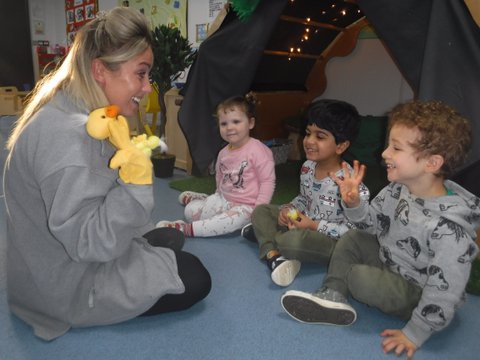We are recruiting for Level 3 qualified Early Years Educators! Find out more here
The Benefits of Nursery Rhymes in your Child’s Development

Share article:
Nursery rhymes may just seem like a bit of fun, a way to spend time and interact with your children or just a quick and easy way to distract them but the truth is nursery rhymes have so many more benefits for your child, both in the long and the short term and are incredibly powerful influencers in pre-school development.
Nursery rhymes have a lot more to offer than just entertainment value. They introduce babies and children to the idea of storytelling, promote social skills and boost language development. They also lay the foundation for learning to read and spell. Generally, children who will become good readers enjoy listening to speech, storybooks and nursery rhymes.
Key Benefits
Children are excited to learn about individuals who live in shoes or a cow who can jump over a moon. Nursery rhymes help your child learn to have a vivid imagination filled with colourful characters and various languages. There are also a number of key skills / development areas that can be influenced by simple nursery rhymes.
Cognitive development – Repetition of rhymes and stories is good for the brain, teaching how language works and improving memory, concentration, spatial intelligence and thinking skills. Because these verses are made up of patterns, they are easy first memorization pieces. Nursery rhymes are organised so that similar sounds jump out at you, which doesn’t happen in everyday speech. Nursery rhymes help your child’s brain segment words into syllables, hear similarities between words that rhyme or start with the same sounds.
Language and Literacy Skills – Nursery rhymes are important for language acquisition and help with speech development. They also help children develop auditory skills such as discriminating between sounds and developing the ear for the music of words. Listening comprehension is a foundational skill that is often skipped, but obviously necessary to learn. They are a great introduction to stories since many contain a beginning, middle, and end (sequencing). Nursery rhymes increase vocabulary (like the word “fetch” in Jack & Jill) and are a great, wonderful introduction to poetry. A rhyme’s repetition can also help your child become aware of the individual units of sound, known as phonemes, which make up words.
Maths – Nursery rhymes are a great way to start familiarising your child with numbers. They’re full of patterns, sequencing, numbers, and counting (forward and backward). For instance, you might ask your son or daughter questions like; “How many blind mice were there?” They also discuss size, weight and other important math vocabularies.
Physical – When actions are linked to words in the nursery rhyme, it helps boost motor skills and improves rhythm and movement. Music training (through playing and listening to music) before the age of seven has significant effect on parts of the brain related to planning and motor skills.
Social and emotional – Nursery rhymes develop humour. Because of the connection between movement, rhythm, and words, singing these songs can be a great group activity and is a great opportunity for children to get to know their peers. As children develop at different rates, using nursery rhymes will support children’s communication and language development at whatever stage they are at, for example, older children may be beginning to learn to rhyme, whereas younger children may still be at the stage of learning new words. Nursery rhymes are familiar and can thus provide comfort and support to youngsters in uncomfortable situations.
How to help as a parent
• Identifying and singing your child’s favourite nursery rhymes repetitively will help them learn. If you sing along with your child, and clap / tap along to the beat or even use items around the home to make music, this will all increase the fun and enjoyment for your child. It’s also important to introduce new rhymes periodically to children to ensure you constantly engage their interest in learning.
• The more actions you use, the easier it will be for the child to visualise the words, as well as making it easier for the child to learn the nursery rhyme. To help in your child’s learning of nursery rhymes you could try missing out words in the nursery rhyme and having your child help fill in the missing words.
• Parents play a key role in promoting healthy reading habits. Simply reading nursery rhymes together daily can help to show your child how important they are. Select rhymes that teach concepts like numbers, colours, shapes, weather etc. to increase children’s love for learning.
• It is important that adults are confident when singing nursery rhymes and songs. If adults are having fun children are more likely to respond.
• Find a way to include nursery rhymes in your everyday routine. Singing nursery rhymes doesn’t just have to be during song time why not share a song or two during nappy time or when children are sitting down for lunch. It is important to remember that younger children will only sit for short periods of time so don’t expect them to sit for a half hour song time session.
So, remember every time you cringe from hearing “Humpty Dumpty” or “Hey Diddle Diddle,” just focus on how important these classics are to your child’s growth plus they are an excellent means of spending time together with your child and developing a close relationship.

